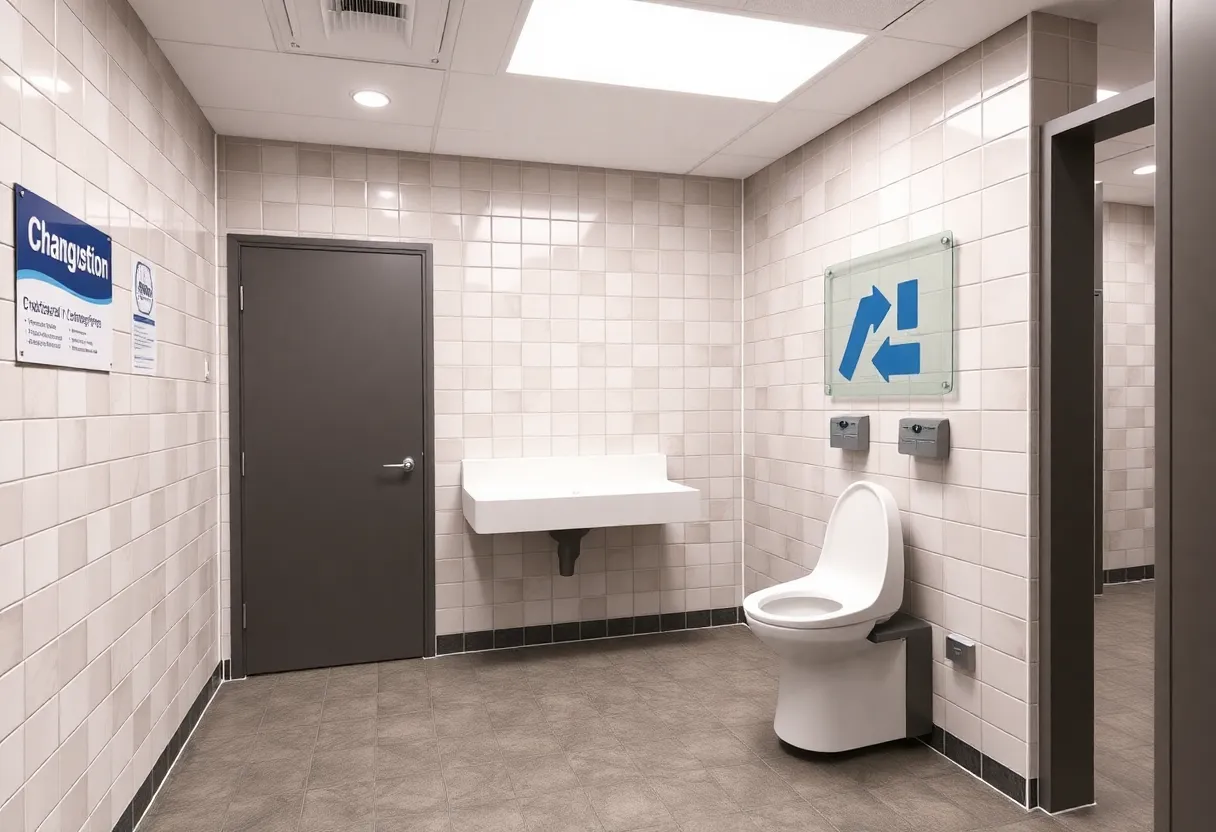News Summary
The Rhode Island House of Representatives has passed legislation that requires adult changing stations in newly constructed public buildings. This initiative seeks to improve accessibility for individuals with disabilities or medical needs who require assistance with changing. The legislation includes regulations for size, signage, and compliance with the Americans with Disabilities Act. Advocates highlight the necessity for inclusivity, while some opposition raises concerns about the installations’ costs. If passed by the Senate and signed by the governor, these requirements will take effect soon, fostering a more dignified restroom experience for all.
Providence, Rhode Island – On Thursday, the Rhode Island House of Representatives passed a significant piece of legislation, 2025-H 5611, that mandates the installation of adult changing stations in newly constructed public buildings. This initiative aims to enhance accessibility for individuals with disabilities or medical needs who require assistance with diapering and similar tasks.
The requirement, if enacted, will extend to all newly constructed, reconstructed, or remodeled public buildings and places of public accommodation in the state starting in 2027. The purpose of this bill, introduced by state Representative Thomas E. Noret (D-Coventry, West Warwick), is to provide a safe and dignified restroom experience for those who are unable to use standard accessible restrooms.
A universal changing station is defined by the legislation as an enclosed changing facility accessible to individuals of all ages and genders, addressing the needs of a diverse population. The Rhode Island Department of Administration will be tasked with crafting regulations to ensure compliance with this new requirement, which must also align with the Americans with Disabilities Act (ADA). These regulations will encompass aspects like signage, size, and overall compliance with the law.
Supporters of the bill emphasize the importance of inclusivity and dignity in public facilities. Currently, there are similar laws in place in seven states, while 14 other states are deliberating comparable measures. The bill has gained traction as a necessary update to public accommodations, with strong backing from advocates for individuals with disabilities.
Within the legislative discussions, compelling personal testimonies have emerged, particularly from Cathy Andreozzi. Her advocacy for the bill highlights the challenges faced by families caring for individuals who require specialized changing facilities. The heart of her message was rooted in the inequities present when seeking appropriate accommodations for basic human needs, emphasizing the dire necessity for updated infrastructure in public restrooms.
Once passed by the House, the legislation will move forward to the Senate, which has already approved a companion measure, 2025-S 0387, introduced by Senator Peter Appollonio (D-Warwick). If both legislative bodies agree on the final wording and the governor signs the bill into law, the new requirements will take effect immediately.
The designated adult changing facilities will be equipped with clear signage, adjustable changing tables that can support up to 350 pounds, and ample space for caregivers to assist those in need. This is anticipated to create environments where all individuals, regardless of their physical capabilities, can access necessary facilities without compromising their dignity.
Despite the strong advocacy for the bill, it has not been without opposition. Some representatives from small business communities express concerns about the financial implications of installations, with potential costs estimated at $3,500 per business. This economic argument suggests a tension between the desire for increased accessibility in public spaces and the burdens it may place on small and privately-owned establishments.
Exemptions to the installation requirement will be available for specific cases where it is deemed infeasible, particularly concerning the historical significance of certain structures. This provision aims to strike a balance between maintaining historical integrity and modernizing public facilities in line with contemporary accessibility standards.
Moving forward, the Rhode Island House and Senate will continue working on finalizing this legislation, with hopes that the new changes will foster a more inclusive environment for all residents and visitors in public spaces across the state.
Deeper Dive: News & Info About This Topic
HERE Resources
Additional Resources
- WPRI: RI House Passes Bill Requiring Buildings to Have Adult Changing Tables
- Patch: Adult Changing Stations in Public Buildings Bill Passes RI State House
- WPRI: Bill Would Require New Buildings in RI to Have Adult Changing Tables
- GoLocalProv: RI Radio Station Drops Format, Hosts Are Off the Air
- Rhode Island Current: Providence Comprehensive Plan Heads to Full Council for Vote
- Wikipedia: Accessibility
- Google Search: Adult Changing Tables
- Google Scholar: Adult Changing Tables Legislation
- Encyclopedia Britannica: Disability
- Google News: Adult Changing Tables Legislation

Author: STAFF HERE PROVIDENCE WRITER
The PROVIDENCE STAFF WRITER represents the experienced team at HEREProvidence.com, your go-to source for actionable local news and information in Providence, Providence County, and beyond. Specializing in "news you can use," we cover essential topics like product reviews for personal and business needs, local business directories, politics, real estate trends, neighborhood insights, and state news affecting the area—with deep expertise drawn from years of dedicated reporting and strong community input, including local press releases and business updates. We deliver top reporting on high-value events such as WaterFire, Rhode Island International Film Festival, and Rhode Island Comic Con. Our coverage extends to key organizations like the Greater Providence Chamber of Commerce and Providence Warwick Convention & Visitors Bureau, plus leading businesses in finance and manufacturing that power the local economy such as Citizens Financial Group and Textron. As part of the broader HERE network, we provide comprehensive, credible insights into Rhode Island's dynamic landscape.





